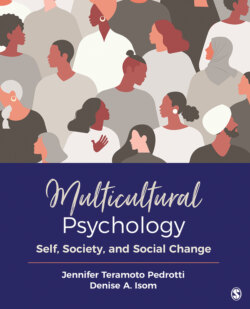Читать книгу Multicultural Psychology - Jennifer T. Pedrotti - Страница 30
На сайте Литреса книга снята с продажи.
Take Part
ОглавлениеWe are all at different stages with our level of comfort on topics involving multiculturalism. Look at the following list, and choose one or two things to try this week to further your knowledge in this area. Try to choose something that requires you to stretch a little—if it seems very easy to you, move up a level. When you are finished with the exercise, write a journal entry about what it was like for you and about what questions you still have.
Participation: Gather more information for yourself on the topics below. You might try a mere Google search at first, and then dive more deeply into authors who study these important concepts. Some authors who study these areas are listed next to each topic. In addition, consider doing your own PsycINFO search or look for reference books on these topics in your local library.
Scientific racism (Stephen Jay Gould, R. M. Dennis, Frederick Douglass)
Explaining differences to children (Rebeca Bigler, Tony Brown and colleagues)
DNA testing issues (e.g., Sheldon Krimsky, https://now.tufts.edu/articles/pulling-back-curtain-dna-ancestry-tests)
Conceptual equivalence (Sam M. Y. Ho, C. Harry Hui, Harry C. Triandis)
The Fourth Force (Paul Pedersen, Derald Wing Sue)
Initiation: Think of someone you know who is different in some way from you in terms of your culture sketch. Find a time to start a conversation with this person about how her or his experience might differ from yours. You could ask the person to complete a culture sketch as well, and then talk about your differences. Which identities feel salient for this person? Which are salient for you? Why?
Activism: Choose a topic like “scientific racism” or “the White Standard” as the basis of a presentation or essay in another class, as an editorial for your campus newspaper, or as a topic of discussion in your friendship group. Prepare with statistics, terms, and details.
